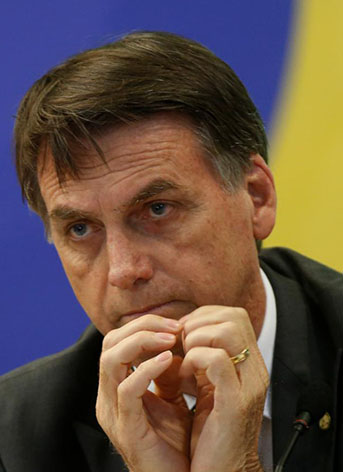 I’m not a fan of Brazil’s ultra-right wing president-elect Jair Bolsonaro, but his decision to nix the programme whereby more than 8,000 Cuban doctors have been working in Brazil as virtual slaves deserves unqualified international support.
I’m not a fan of Brazil’s ultra-right wing president-elect Jair Bolsonaro, but his decision to nix the programme whereby more than 8,000 Cuban doctors have been working in Brazil as virtual slaves deserves unqualified international support.
What’s more, the international community should use the occasion and condemn the Washington-based Pan American Health Organization, a branch of the U.N.’s World Health Organization. PAHO has supervised the Cuban doctors’ programme in Brazil since its inception in 2013.
Under the deal between the Brazilian and Cuban governments, and brokered by PAHO, more than 18,000 Cuban doctors have been working in Brazil’s rural areas with little access to healthcare. They have received 30 percent of their salary. The remaining 70 percent goes directly to Cuba’s dictatorship.
Just as outrageous, Cuba does not allow its doctors to take their families with them. Families remain in Cuba as de facto hostages, to reduce the risk of mass defections. If the doctors defect, they can’t return to the island for at least eight years, according to physicians who have been part of the programme.
And PAHO has been happily going along with all of this, publicly praising the programme without any international outcry about its role enabling this form of virtual slavery.
“It’s scandalous that an international organization such as PAHO doesn’t have serious objections to the exploitation of these Cuban doctors,” says Jose Miguel Vivanco, head of the Americas’ division of Human Rights Watch.
Bolsonaro, a former army captain scheduled to take office Jan. 1, had said he would not renew the Mais Medicos — More Doctors — programme unless Cuba accepted three conditions: that Cuban physicians receive their full wages; their medical degrees be validated by Brazil; and they be allowed to bring their families.
On Wednesday, Bolsonaro tweeted that, “Unfortunately, Cuba has not accepted.” Hours later, Cuba announced it would withdraw from the Mais Medicos deal and that it was starting its repatriation of Cuban physicians right away.
Exporting its doctors has become one of Cuba’s main sources of foreign income. There were about 37,000 doctors working in 77 countries in 2015, most of them in Venezuela, Brazil and Central America, according to a Wharton School at the University of Pennsylvania study. Cuba earns an estimated $11 billion a year from this trade.
Former Brazilian President Dilma Rousseff, who started the Mais Medicos programme, said in a statement that the withdrawal of Cuban physicians will leave “tens of millions of Brazilians” in remote areas, where few Brazilian doctors were willing to serve, without access to healthcare.
PAHO’s reaction? Its Brazil office told me in an email that, while the regional health organization has “implemented” the Mais Medicos agreement between Brazil and Cuba since 2013, its main role has been to “monitor and evaluate” the programme.
PAHO’s participation in the programme “does not extend to the physicians’ contracts,” spokesman Luis Felipe Sardenberg wrote to me. “The physicians have contracts with the Cuban government”, and it’s not PAHO’s role “to interfere in the contractual agreement between the governments and the physicians they hire.”
That’s one of the poorest excuses I have ever heard from an international organization overseeing a multinational programme.
It tacitly claims that neither PAHO nor the WHO are responsible for overseeing a deal largely based on gross human-rights violations. PAHO has known of this since Day One. It has been widely reported since the start of the Mais Medicos programme that it was a thinly disguised programme of virtual slavery.
There is nothing wrong with Brazil hiring doctors from Cuba, or from any other country, to work in remote rural communities. But the terms of the deal were a blatant violation of the doctors’ basic human rights.
Bolsonaro was right to denounce this agreement. And PAHO — as well as its mother organization, the WHO — should be held responsible for its scandalous role enabling a modern-day slavery agreement.










